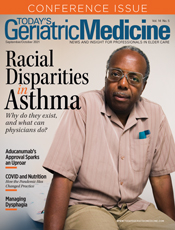
September/October 2021
From the Editor: New Hope for Alzheimer’s Patients? Time and again, potential breakthroughs in the treatment of Alzheimer’s disease—many wildly hyped—have fallen flat. The history of the disease is checkered with failure, hundreds of drug trials raising hopes and soon dashing them, failing to meet their promise. The debilitating disease afflicts 6.2 million Americans, and—especially in light of the growing aging population—there’s an urgent need for therapies that not only treat symptoms but also make a difference by influencing the disease process itself and stemming progression. With each new effort, optimism grows and is shattered. A 2020 international trial of two experimental drugs sponsored by Washington University in St. Louis, for example, curbed enthusiasm for the hypothesis that if treatment was given before a patient experiences symptoms, the disease could be halted. As one after another trial of antiamyloid drugs has come up short in clinical trials and confounded researchers, some scientists are calling into question the conventional wisdom about the most widely accepted characteristics the disease—chiefly, that amyloid plaques in the brain are key. In light of these failures, a February 2020 report in The New York Times noted that some are even asking whether it’s time for researchers to turn away from the development of such drugs. Others point to the fact that the progression of Alzheimer’s disease consistently involves excess accumulation of amyloid in the brain followed by the tangles of tau that result in neuronal death. While there are antiamyloid drugs in Phase 3 trials, early-stage research is broadening the target, the Times reported, adding that roughly two-thirds of pharmacological trials are investigating other approaches. On June 7, the FDA, using the accelerated approval pathway, approved the first new treatment in more than two decades. The new drug, Aduhelm (aducanumab) is being hailed as a promising advance by some, while others brace for yet another disappointment. Evaluated in three studies involving a total of 3,482 patients, the drug significantly reduced amyloid beta plaque in the brain. Yet this latest headline-grabbing “breakthrough” is generating considerable controversy. There’s concern about the efficacy of the therapy and the effect its fast-tracking may have on future drug approval, suggesting it may raise false hopes and put them ahead of the science. The drug, though not a cure, appears to slow cognitive decline in some patients in ways that are not clear. While hopes again run high, many questions remain. In this issue, contributor Jennifer Lutz looks at the controversy and discusses the knowns and unknowns. In a related story, Scott Gray discusses the challenges of recruiting and retaining patients for clinical trials of potential treatments for Alzheimer’s disease. |
